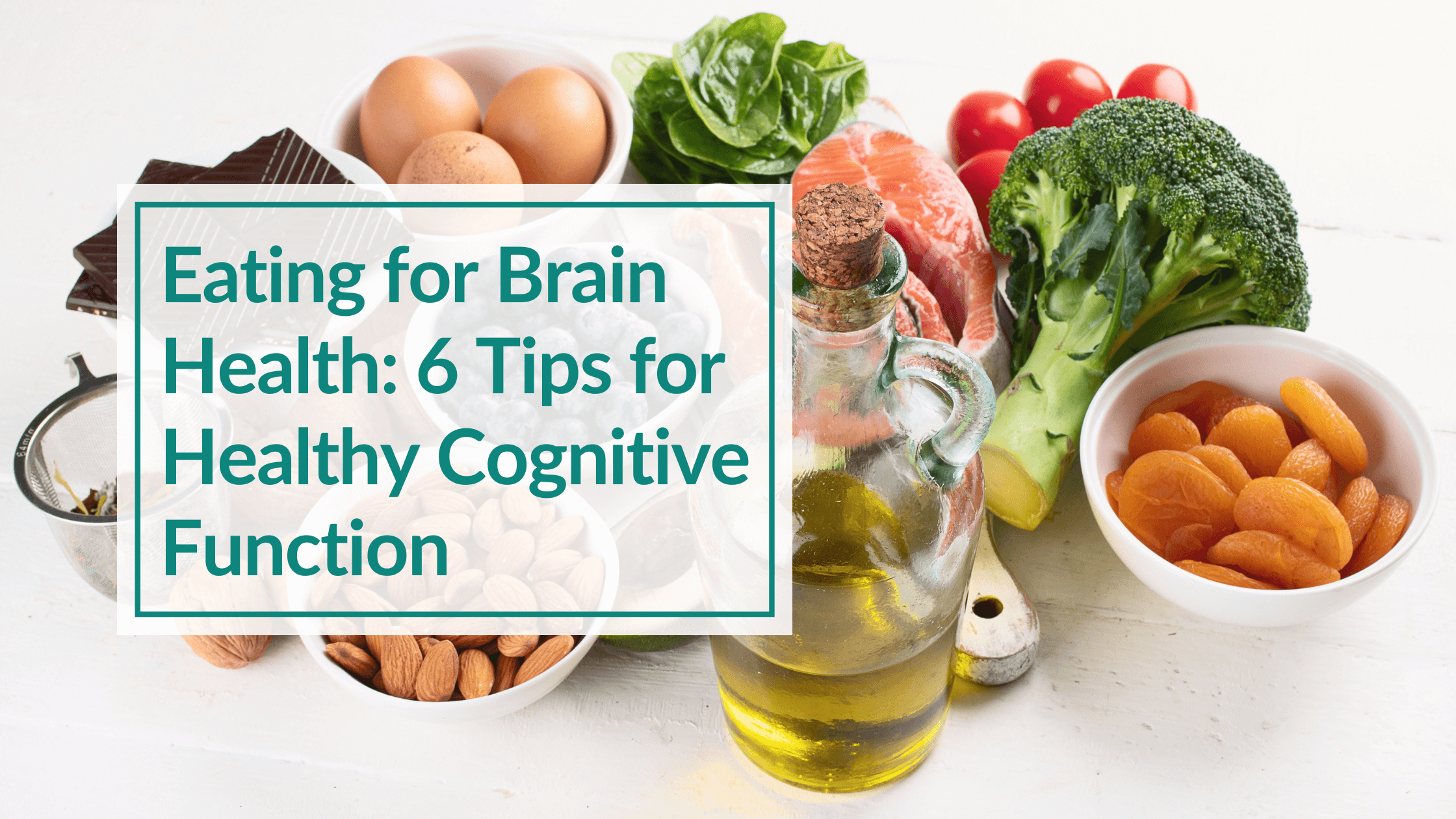
Why Eating for Brain Health Matters
How often do you consider eating for brain health? Sometimes, we eat simply because we’re hungry or maybe because we’re craving comfort. But what if the foods you choose could actually boost your brainpower?
Picture this: after a long, draining day at work, you reach for a sugary donut or some chips for a quick pick-me-up. It might feel good for a moment, but soon, you’re hit with a slump that leaves you feeling foggy and drained. Studies show that consuming a lot of refined sugars can lead to decreased brain function and worsen mood disorders like depression. That’s because our brains need steady, consistent fuel to stay sharp and focused.
Think about the last time you felt mentally sharp and focused. Chances are, you were eating nutrient-dense foods that provided steady energy and helped keep your blood sugar balanced.
Eating for brain health isn’t just about avoiding unhealthy snacks (we’re all about moderation)—it’s about choosing foods that sustain and support your cognitive function.
This blog guides you through some fantastic foods for brain health and shares 6 practical tips to enhance your cognitive function. Whether you’re looking to boost memory, improve focus, or just feel more mentally sharp, these tips may help you make nourishing choices that benefit your brain and overall well-being.
Eating Foods for Brain Health

Eating for brain health isn’t just a trend—it’s crucial to maintaining cognitive function and overall well-being. A healthy diet can significantly boost brain health. That’s because your brain doesn’t operate in a vacuum; it depends on the health of your entire body! Balanced eating supports brain function as well as the Cardiovascular System, Immune System, Endocrine System, Digestive System, and more.
Cognitive decline, memory loss, and mental fatigue aren’t just inevitable signs of aging or health issues that we have to accept. Poor nutrition or lack of absorption in the gut may contribute to the acceleration of the decline of brain health. These issues increase inflammation, oxidative stress, and deficiencies in essential nutrients. That means, on the flip side, making healthier choices can have a protective effect, enhancing your brain health and overall vitality.
However, even with a balanced diet, there can be factors that lead to cognitive issues. For example:
- Exposure to Mold: If you’ve been exposed to mold, you might experience brain fog and fuzzy thinking despite eating well.
- Hormonal Imbalances: Going through perimenopause or menopause can affect cognitive sharpness due to fluctuating estrogen levels.
- Thyroid Imbalance: An imbalance in your thyroid function can impact your brain health, leading to issues like recall or difficulty concentrating.
So, if you’re wondering, “I eat healthy! Why do I still feel drained, exhausted, or mentally foggy?”—we hear you! It’s important to recognize that, in general, eating for brain health means eating food with lots of vitamins, minerals, and antioxidants that nourish the brain and protect it from oxidative stress, the free radicals that are produced when the body uses oxygen, which can damage cells.
To address any nutrient or hormonal imbalances or find out if you have resonating toxins like mold or parasites, consider exploring bioresonance testing. Our Full Scan would be the most comprehensive and help connect health concerns with various body systems.
Disclaimer: At CBH, we do not diagnose health conditions. We CAN help identify things that may be stressing the energetic field in our body.
Here are some specific foods for brain health and natural supplements that can help keep your brain sharp and resilient. Incorporating these into your diet can support cognitive function and overall well-being.
Food for Thought: The Best Nutrients for Cognitive Health
1. Fatty Fish (Salmon, Mackerel, Sardines)

Why it’s good for your brain: Fatty fish are rich in omega-3 fatty acids like DHA and EPA. These healthy fats are vital when eating for brain health, as they help build and maintain brain and nerve cells. DHA makes up a good portion of the brain’s gray matter, which is involved in processing information and regulating emotions. EPA not only supports brain health by reducing inflammation but has also been linked to a more stable mood and lower risk of depression.
Tip: Aim to include fatty fish in your diet at least twice a week. If you’re concerned about the heavy metals that can affect fatty fish like salmon, opting for a fish oil-based omega-3 supplement is a good alternative. Look for products from reputable companies that test for heavy metals and other contaminants to ensure purity and safety.
2. Blueberries
Why it’s good for your brain: Blueberries are packed with antioxidants, particularly anthocyanins, which help reduce oxidative stress and inflammation. These natural compounds can also boost brain signaling and improve memory. Research suggests that the brain-boosting antioxidants in blueberries may even help delay brain aging by up to 2.5 years!
Tip: Toss a handful of blueberries into your morning smoothie or enjoy them as a snack throughout the day to enhance your intake of foods for brain health.

3. Turmeric
Why it’s good for your brain: Turmeric is celebrated for its natural compound, curcumin, which boasts powerful anti-inflammatory and antioxidant properties. Although curcumin is notoriously difficult for the body to absorb, ongoing research has led to various methods to enhance its absorption, like combining it with piperine from black pepper. While there’s some debate about whether curcumin can cross the blood-brain barrier, studies show that it can increase brain-derived neurotrophic factor (BDNF), a protein associated with improved memory and cognitive function.
Tip: Sprinkle turmeric into your soups or smoothies, or consider a curcumin supplement in addition to all the delicious foods you’re eating for brain health!
4. Dark Chocolate
Why it’s good for your brain: Dark chocolate isn’t just a treat; it’s brain food! It’s loaded with flavonoids, caffeine, and antioxidants, all of which improve memory and lift your mood by increasing blood flow to the brain. Flavonoids (that Vitamin P again!) have a vast array of neuroprotective properties. Eating foods rich in flavonoids throughout your life can help to limit neurodegeneration and prevent age-related cognitive decline.
Tip: Indulge in dark chocolate with at least 70% cocoa content for the most brain-loving benefits—guilt-free!
Note: If you’re experiencing brain fatigue and suspect mold exposure, be cautious about mold on chocolate and choose options that are mold-free.
5. Nuts (Especially Walnuts)
Why they’re good for your brain: Ever look at a walnut and think it looks like a brain!? Nature might have had a clever hint in mind! Many nuts, especially walnuts, are rich in healthy fats, antioxidants, and vitamin E. This vitamin helps shield your brain from oxidative stress, keeping your mind sharp and agile.
Tip: Carry a small bag of mixed nuts for a crunchy, brain-boosting snack wherever you go!
6. Eggs
Why they’re good for your brain: Eggs are a breakfast powerhouse packed with brain-loving nutrients like vitamins B6, B12, folate, and choline. Choline, in particular, helps create acetylcholine, a neurotransmitter that is key for mood and memory, making eggs a great addition to eating for brain health.
Tip: Start your day with eggs—whether scrambled, boiled, or in an omelet.

7. Green Tea
Why it’s good for your brain: Green tea contains caffeine and L-theanine. L-theanine is an amino acid found in green tea and certain mushrooms. It increases neurotransmitters like GABA, dopamine, and serotonin, which promote relaxation and improve mood while maintaining focus and alertness. The combination of L-theanine and caffeine enhances brain function, improves concentration, and provides a state of calm alertness without the jitteriness often associated with caffeine alone.
Tip: Swap out your coffee for a cup of green tea to enjoy its balanced brain-boosting effects.
5 Tips for Enhancing Your Brain Health

A healthy brain involves more than adding the right foods for brain health. It involves a comprehensive approach that supports cognitive function from multiple angles. Incorporating habits that enhance mental well-being, along with brain-boosting supplements, can make a significant difference in maintaining and improving cognitive performance. Here are some actionable tips for you to incorporate into your day!
Tip 1: Prioritize Quality Sleep
Adequate rest allows your brain to repair itself, consolidate memories, and clear out toxins accumulated throughout the day. Strive for 7-9 hours of restorative sleep each night. Establish a calming bedtime routine, keep your sleep environment cool and dark, and minimize screen time before bed to enhance sleep quality.
Tip 2: Manage Stress Effectively
Chronic stress can negatively impact brain health, and it doesn’t have to be just mental stress—body-wide stress from factors like microbes, blood sugar imbalances, or other physical challenges can also take a toll. Incorporate things like mindfulness, deep breathing exercises, and progressive muscle relaxation into your routine. These practices help lower cortisol levels, reduce anxiety, and improve mental clarity, supporting overall brain health.
Tip 3: Stay Mentally Active
Keeping your brain engaged is crucial for cognitive health. Challenge your mind with activities like solving puzzles, reading stimulating books, or learning new skills. Regular mental exercise helps strengthen neural connections and supports long-term brain health, complementing your efforts when eating for brain health.
Tip 4: Physical Exercise
Regular physical activity enhances blood flow to the brain, reduces inflammation, and promotes the release of neuroprotective factors. Aim for at least 150 minutes of moderate-intensity exercise each week, such as brisk walking, cycling, or swimming, or look at bioenergetic exercises like mindful walking.
Tip 5: Stay Socially Connected
Maintaining social connections is vital for cognitive health. Engaging in meaningful conversations and social activities keeps your brain active and can help protect against cognitive decline. Prioritize spending time with friends and family, join clubs or groups that interest you, and participate in community events to stay socially engaged.
Tip 6: Natural Supplements for Brain Health
In addition to eating for brain health, adding specific nutrients, herbs, mushrooms, and amino acids in supplement form can offer targeted support for your cognitive well-being. These supplements work to optimize brain function, support overall mental vitality, and maintain focus and resilience in the face of daily challenges.
Bacopa Monnieri
Known for its memory-enhancing properties, Bacopa Monnieri supports attention and information processing. This supplement has a long history in Ayurvedic medicine as a cognitive enhancer.
Phosphatidylserine
Phosphatidylserine is vital for maintaining healthy brain cells. It’s linked to improved memory and cognitive performance and helps support overall brain health.
Acetyl-L-Carnitine
This is an amino acid that promotes energy and mental clarity. It’s beneficial for older adults, boosting brain function by aiding in producing acetylcholine, a key neurotransmitter for memory and learning. It’s like a little spark plug for your brain.
Lion’s Mane Mushroom
Lion’s Mane gets a lot of attention! It falls into the category of medicinal mushrooms. This remarkable mushroom supports brain cell growth and enhances cognitive function. It is also known for its potential to spark new brain cell connections.
Rhodiola Rosea
This could be a go-to for fighting mental fatigue and improving cognitive function under stress. Often used as an adaptogen, it helps your body handle stress more effectively and boosts mental performance, making it a handy supplement for navigating life’s challenges.
To see if any natural supplements will match your individual bioenergetic health, many of our scans include a balancing remedy section that shows your top matches.
Walk through a Full Scan Report on YouTube!
As you work towards boosting your brain health, remember that eating for brain health is just one piece of the puzzle. A holistic approach that includes good sleep, stress management, mental stimulation, regular exercise, and social engagement all contribute to a healthy brain.
If you still feel off despite making healthy choices, consider exploring our Full Scan. It’s a thorough tool that can help you find things like energetic hormonal imbalances, resonating food sensitivities, or toxins that could be affecting your brain health.
Eating for brain health is a fantastic start, but a comprehensive approach can help you feel your best. Embrace these tips and consider exploring all options to support your brain and overall vitality.
We’re launching something exciting that will give you an even clearer picture of your brain’s energetic health. Stay tuned for a brand NEW scan that will soon offer detailed insights into how your brain and body interact.
DISCLAIMER: Balanced Health, LLC/CBH Energetics and any parent, subsidiary, affiliated, or related entities and companies do not provide medical advice or services. This post and the bioenergetic products and services offered by Balanced Health, LLC/CBH Energetics including, but not limited to, bioenergetic tests, bioenergetic scans, bioenergetic reports and related products and services (collectively the “Bioenergetic Products and Services”) are designed for educational and informational purposes only and are not intended to diagnose, treat, cure, or prevent any disease, condition, complaint, illness or medical condition and are not a substitute for professional services or medical advice. Testing is not used for the purpose of obtaining information for the diagnosis, prevention, or treatment of disease or, the assessment of a health condition or for identification purposes.


